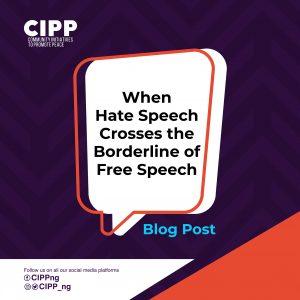
With the election cycle fast approaching, the political atmosphere is saturated and the politicians and their agents are already on the lookout to outwit each other with a war of words.
In the last few weeks, some of the statements credited to politicians and their supporters have become a real source of worry for stakeholders who say such comments, if left unchecked, are capable of plunging the country into serious crises.
As a result, there have been several public discussions and debates aimed at finding ways of ending inciting comments and hate speech; ours is one of such spaces where we continuously extoll the virtues of free speech while checking the excesses of hate speech.
Hate speech is not free speech
Hate speech is an abuse of the fundamentals of freedom of expression. We are free to express ourselves, even to the extent that our opinion may offend, shock, or disturb others. But not everything is acceptable as free speech. The moment people start publicly inciting violence, hostility or discrimination against a group of persons, then this is hate speech which is not free speech. From shouting at someone in the street to posting offensive comments online – hate speech can take many forms and there is one place it has the most devastating effect, in the political space.
The term hate speech shall be understood as covering all forms of expressions which spread, incite, promote or justify racial hatred, xenophobia, anti-Semitism, or other forms of hatred based on intolerance. As a result, it generates stigmas, stereotypes, prejudices, and discriminatory practices against those who are constructed as being different.
Free speech has gone awry when it crosses the boundaries of decency, public discussion, and the spirit of collaboration and reflection. Hate speech is often a precursor to discrimination, harassment, and violence as well as a precursor to serious (and) harmful criminal acts. We believe that it is very doubtful if there will be hate-motivated violent attacks anywhere without hate speech and the hatred that it purveys.
Hate speech, where does the law stand?
The constitution of the Federal Republic of Nigeria states in
Section 95 (1), “no political campaign, slogan shall be tainted with abusive language directly or indirectly, likely to injure religious, ethnic, tribal or sectional feeling.”
Subsection 2 “Abusive, intemperate, slanderous or base language or insinuations or innuendos designed or likely to provoke violent reactions or emotions shall not be employed or used in political campaigns.”
Subsection 3 “Places designated for religious worship, police stations, and public places shall not be used for political campaigns, rallies, and processions or to promote, propagate or attack properties, candidates or their programs or ideologies.”
Section 102 stipulates that ‘Any candidate or person or association who engages in campaigning or broadcasting based on the religious, tribal or sectional reason for the purpose of promoting, opposing a particular political party or the election of a particular candidate is guilty of an offense.
According to the 2010 Electoral Act, the punishment for this offense is a fine of not more than N1, 000, 000 or imprisonment for 12 months or both.
Drawing the line
Where do we draw the line between hate speech or inciting comments and freedom of expression? The underlining factor, it appears, is Intention and while intention cannot be quantified in any scientific way, if the speech or conversation damages the reputation of others, national security, and public order, health, morals, or otherwise, it is a hate speech.
During this election cycle, we all must be on the lookout for hate speech and must be willing to call it out. Much more, we must refrain from all sorts of hate speech – religious indictment and tribal sentiment. In the spirit of national cohesion and nation-building, we must all watch ourselves.
This article was written and prepared by the Community Initiatives to Promote Peace project, CIPP.
CIPP is a USAID-funded project that aims to promote peaceful coexistence and collaboration in Nigeria by mitigating violent conflict in at-risk communities in Nigeria. The social media campaign component of the project is all about enlightening Nigerians on the dangers of spreading fake news, rumors, and hate speech on social media, as it contributes to the violent conflict and insecurity that affects us all. The social media campaign is currently in its second season, and this year, we are solely focused on promoting positive election behaviors ahead of the 2023 general elections.
